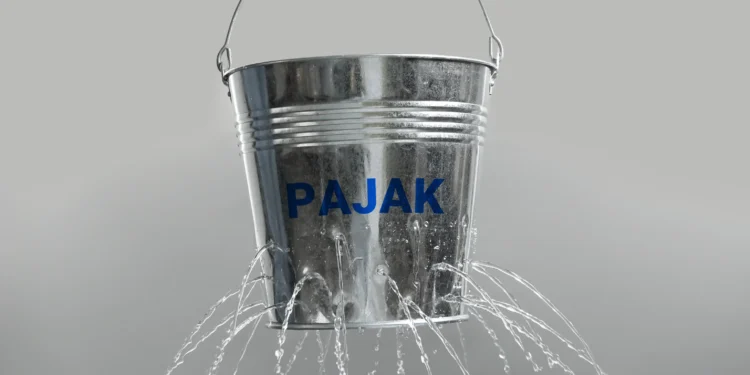Many publications in mainstream media include Indonesia the group of countries with the highest tax revenue leakage in the world. This assumption is proven by Indonesia’s tax ratio, which is still in the low category. Even for the Asia Pacific region, Indonesia ranks in the bottom three.
This creates ambiguity because the realization of tax revenues continues to grow. In 2023, Indonesia will record impressive tax revenues by exceeding the stated target, with an achievement of 102.8%. Despite this, Indonesia’s tax ratio is still relatively low.
One of the main causes of low tax ratios is the difficulty of minimizing potential tax revenue leaks. Leakage of state revenue from taxes occurs when tax revenues do not enter the state treasury. Leakage of state revenue from taxes is a serious problem that can have a negative impact on development targets and community welfare.
To overcome this problem, it is important to understand the various causes and find the right solution. Many problems can cause revenue leaks, both from the side of taxpayers and tax collection officials.
Reason from the Taxpayer’s Side
- Tax Avoidance
Tax avoidance occurs when taxpayers take advantage of loopholes in tax law to reduce the amount of tax they have to pay. This behavior is usually caused by a tax system that is too complex (it often changes), tax rates that are too high, weak effective supervision from the tax authorities, and many other causes.
- Tax Evasion
Tax evasion is an illegal act in which a taxpayer deliberately hides income, reduces tax obligations, or does not pay taxes that should be paid through fraudulent and unlawful means. Tax evasion results in a reduction in state revenues and can be subject to criminal sanctions or heavy fines.
- Taxpayer Non-compliance
Taxpayer non-compliance is a condition where individuals or companies do not fulfill their tax obligations in accordance with applicable regulations. Examples include not reporting income, not paying taxes on time, or not providing accurate information to the tax authorities. However, non-compliance can be intentional or unintentional. Unintentional non-compliance usually occurs because taxpayers find it difficult to understand or are reluctant to comply with existing tax administration rules, even with ignorance and misunderstanding about reporting procedures and the amount of tax that must be paid.
Reason from the tax authorities’s side
- Corruption and Collusion
Corruption among tax officials and collusion between taxpayers and tax officials can lead to inappropriate tax revenues. Usually, the form of corruption and collusion that exists is when tax authorities make an agreement regarding the act of falsifying the amount of tax that should be paid by the taxpayer. The cases of Gaius Tambunan, Angin Prayitno, and Rafael Alun are examples of a series of cases involving tax officials in cases of corruption and collusion.
- The Complexity of Tax Rules
Suppose the tax system is too complicated, both for taxpayers and for the tax authorities responsible for supervising and collecting taxes. In that case, it will be easier for errors or violations to occur. On the one hand, tax rules must follow developments in a dynamic business environment, including technological advances, globalization, and changes in business trends. Still, on the other hand, this can lead to additional rules or further changes to cover new aspects of the business environment. which gives rise to more complex rules.
- Differences in Legal Interpretation
The complexity of the rules ultimately allows existing tax regulations to be ambiguous, which can lead to different interpretations by taxpayers and tax officers. To avoid ambiguity, sometimes regulators often create new tax rules which often become more detailed and complex. However, this is more often correlated with the emergence of more complex rules for taxpayers.
How to Preventing Leakage
- Increase Tax Transparency
Transparency in the tax system is key to preventing leaks. Small things that can be done include publishing information regarding tax policies, tax rates, and government financial reporting openly and easily accessible to the public. This will certainly be able to increase public confidence in taxes and, therefore, minimize leakage of state revenue through taxes.
- Strengthening Supervision and Law Enforcement
Strengthening supervisory institutions and tax law enforcement can help detect and take action against tax violations. Stricter audits of taxpayers, as well as strict law enforcement against tax violations, can be a series of effective actions in preventing leaks due to deliberate tax avoidance behavior.
- Utilization of Information Technology
Penggunaan teknologi informasi, seperti sistem informasi perpajakan yang terintegrasi dan analisis data yang canggih, dapat membantu dalam mengidentifikasi potensi kebocoran dan memperbaiki proses administrasi pajak.
- International Cooperation
Kerja sama dengan negara lain dalam pertukaran informasi perpajakan dan koordinasi tindakan penegakan hukum lintas batas sangat penting untuk diupayakan. Hal ini akan mengurangi kemungkinan perusahaan atau individu memanfaatkan perbedaan hukum pajak di berbagai yurisdiksi untuk menghindari pembayaran pajak.
- Tax Education and Awareness
Educating the public about the importance of paying taxes and the consequences of non-compliance can help reduce leakage. Tax education and socialization campaigns can also help change people’s attitudes toward tax obligations.
- Encourage Private Participation
Private sector participation in promoting tax compliance can help reduce leakage. To encourage active private sector participation, the government can provide various tax incentives for companies that implement good tax compliance practices and actively support the government in efforts to prevent leakage.
Preventing leakage of state revenues from taxes requires joint efforts from the government, society, and the private sector. With appropriate preventive measures, we can ensure that the taxes that taxpayers are supposed to pay are actually received by the state, which in turn will contribute to economic development and the overall welfare of society.














